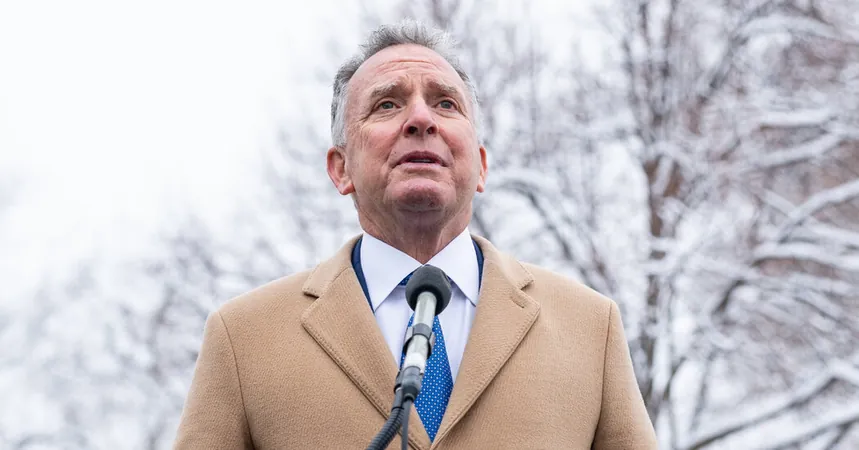
Trump's Bold Move: Demanding a Stronger Iran Nuclear Deal Than Obama's
2025-04-09
Author: Yan
Back in 2016, Donald Trump laid out a bold strategy for tackling the Iranian nuclear threat during his presidential campaign. He asserted that if Barack Obama's negotiation team had simply walked away from the table, Iran would have been left scrambling for a better deal. "They negotiated so badly," Trump remarked, suggesting that a stronger stance could have led to a far superior agreement.
Fast forward to today: With Iran inching closer to weaponization—partly due to Trump's own 2018 decision to dismantle the previous nuclear agreement—the stakes are higher than ever. Trump's current challenge? Craft a deal that's much tougher than the one his predecessor agreed upon.
On one side, Iranian leaders seem to want a modernized version of the Obama-era deal, which aimed to limit their nuclear stockpiles. On the other, the U.S. is demanding a complete dismantling of Iran's nuclear infrastructure, missile programs, and support for groups like Hamas and Hezbollah.
Time is not on their side. Senator Jeanne Shaheen emphasized this urgency, stating, "Iran's nuclear program is advancing every day, and we risk losing our leverage as snapback sanctions are set to expire soon." These crucial sanctions could be reinstated quickly if diplomacy fails but are set to lapse on October 18.
Trump's administration is under pressure to reach a substantially tougher agreement. Military options are reportedly not off the table, although it's unclear who would take action if talks go awry—whether it would be the U.S., Israel, or a combined force.
Senator Jim Risch pointed out the shift in dynamics, stressing, "The Iranians will be surprised when they realize they're not dealing with Obama or Kerry; this is a whole different ballgame." Negotiations are set to kick off this Saturday, led by Steve Witkoff, a real estate mogul and friend of Trump.
Witkoff faces a monumental task, as previous agreements merely focused on Iran's nuclear program without addressing its missile capabilities or support for terrorism. National security adviser Michael Waltz insists that any new agreement must encompass everything, calling for a complete disarmament of Iran's nuclear capabilities, leaving them exposed and incapable of threat.
However, the negotiating tactics appear to differ significantly. While Trump aims for direct engagement with Iranian officials, Iran’s foreign minister is calling for indirect negotiations, demanding the U.S. first abandons any military threats. Experts are already raising concerns about the balance of power in these talks, with doubts about whether Trump's team has the expertise needed to tackle such complex negotiations.
With Iran's nuclear program having advanced significantly—producing uranium enriched to nearly weapon-grade levels—the stakes couldn’t be higher. But Iran's position isn't without its vulnerabilities; recent Israeli strikes have severely weakened Iran's air defenses, while its regional proxies face their own challenges.
Critics are skeptical of the likelihood of a successful negotiation, predicting that the upcoming discussions may be unproductive, especially given that Witkoff lacks substantive experience in nuclear diplomacy. According to experts, this isn't merely about striking a deal; it requires deep technical knowledge and a clear strategic endgame. If not, there's a real risk that Trump's team could be outmaneuvered by a more experienced Iranian negotiation team.



 Brasil (PT)
Brasil (PT)
 Canada (EN)
Canada (EN)
 Chile (ES)
Chile (ES)
 Česko (CS)
Česko (CS)
 대한민국 (KO)
대한민국 (KO)
 España (ES)
España (ES)
 France (FR)
France (FR)
 Hong Kong (EN)
Hong Kong (EN)
 Italia (IT)
Italia (IT)
 日本 (JA)
日本 (JA)
 Magyarország (HU)
Magyarország (HU)
 Norge (NO)
Norge (NO)
 Polska (PL)
Polska (PL)
 Schweiz (DE)
Schweiz (DE)
 Singapore (EN)
Singapore (EN)
 Sverige (SV)
Sverige (SV)
 Suomi (FI)
Suomi (FI)
 Türkiye (TR)
Türkiye (TR)
 الإمارات العربية المتحدة (AR)
الإمارات العربية المتحدة (AR)